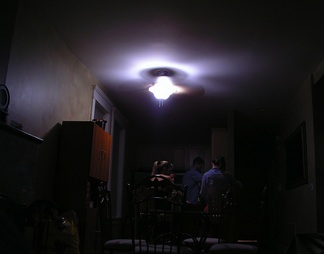
Earlier today, Google’s Sergey Brin and Eric Schmidt held an informal press conference of sorts (see my live notes), touching upon pretty much everything under the Google sun. One issue that kept on coming up was Google’s growing power in general. Google touches so many parts of the Web and our lives that concerns are rising that Google will use its power and all the knowledge it collects about us inappropriately.
Every time the suggestion came up that Google’s power is too pervasive, Schmidt knocked it down: “If we went into a room and were exposed to evil light and came out and announced evil strategies, we would be destroyed. The trust would be destroyed.”
He was, of course, speaking metaphorically (about the room, not the trust). “We have not yet found the evil room on our campus,” Schmidt assured everyone in the room (which was a bright and cheery conference room above Chelsea Market,not dimly lit or evil at all). Later on, he prefaced another discussion of the (hypothetical) evil room by saying, “There are many reasons why we will not be like Microsoft.” Maybe he thinks the evil room is on Microsoft’s campus.
Danny Sullivan of Search Engine Land pressed Schmidt on the fact that “you seem to have data other people cannot get because you give away free tools.” Google knows not only what you are searching for, but if you use Google Analytics, it knows about the traffic to your site, and if you use Google Checkout it knows about what you are selling. Isn’t there a closed loop here, he asked, where Google gives away free products, and then collects all the data which makes its search engine smarter?
Neither Schmidt nor Brin addressed the question of whether or not Google uses data from its non-search products to improve search in this manner, but Schmidt rejected the idea that customers are locked in. “There is no closed loop,” he said, “there are competitors and we make it possible for you to get out.”
Brin elaborated on this notion, pointing out that the entire source code for its new Chrome operating system is open sourced. Schmidt picked up on that and argued that Google’s open nature will protect it from the evil room (which doesn’t exist anyway):
“Today we have zero market share in Chrome OS because it is not shipping. Imagine a scenario where we got to 80% market share with a free product, which I think is unlikely. Let’s say we go into the evil room and decide to start charging. A competitor would be able to take the code that we had and continue to offer our business model, while our new business model runs us into the ground. That is why open source provides a protection.”
Google won’t be getting to 80% market share in desktop operating systems anytime soon. Even its Chrome browser seems to be barely making a dent, although Schmidt disputed that notion as well. When I asked him if Steve Ballmer was wrong to call the Chrome browser’s market share a “rounding error,” Schmidt snipped, “I don’t respond to Steve Ballmer questions. Next question?”
(Photo credit: Flickr/Typicalgenius)